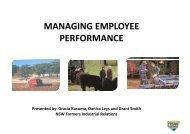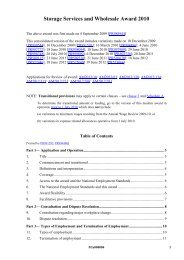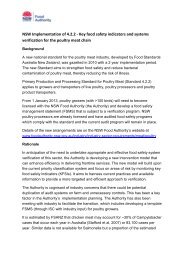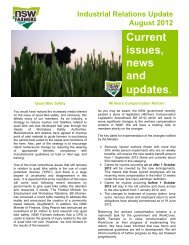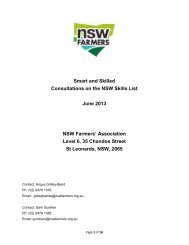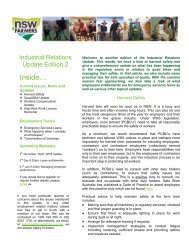MA000073 - Food, Beverage and Tobacco Manufacturing Award 2010
MA000073 - Food, Beverage and Tobacco Manufacturing Award 2010
MA000073 - Food, Beverage and Tobacco Manufacturing Award 2010
You also want an ePaper? Increase the reach of your titles
YUMPU automatically turns print PDFs into web optimized ePapers that Google loves.
<strong>Food</strong>, <strong>Beverage</strong> <strong>and</strong> <strong>Tobacco</strong> <strong>Manufacturing</strong> <strong>Award</strong> <strong>2010</strong><br />
(f)<br />
In computing overtime each day’s work st<strong>and</strong>s alone.<br />
33.2 One in, all in does not apply<br />
The assignment of overtime by an employer to an employee is to be based on<br />
specific work requirements <strong>and</strong> the practice of one in, all in overtime must not apply.<br />
33.3 Rest period after overtime<br />
(a)<br />
(b)<br />
(c)<br />
(d)<br />
(e)<br />
When overtime work is necessary it must, wherever reasonably practicable, be<br />
arranged so that an employee has at least 10 consecutive hours off duty<br />
between the work of successive working days.<br />
An employee, other than a casual employee, who works so much overtime<br />
between the termination of their ordinary hours on one day <strong>and</strong> the<br />
commencement of their ordinary hours on the next day that the employee has<br />
not had at least 10 consecutive hours off duty between those times must,<br />
subject to the other provisions of clause 33.3, be released after completion of<br />
the overtime until the employee has had 10 consecutive hours off duty without<br />
loss of pay for ordinary hours occurring during such absence.<br />
If on the instructions of the employer an employee resumes or continues work<br />
without having had the 10 consecutive hours off duty the employee must be<br />
paid at the rate of 200% until the employee is released from duty for such<br />
period. The employee is then entitled to be absent until the employee has had<br />
10 consecutive hours off duty without loss of pay for ordinary hours occurring<br />
during the absence.<br />
By agreement between the employer <strong>and</strong> individual employee, the 10 hour<br />
break provided for in clause 33.3 may be reduced to a period of no less than<br />
eight hours.<br />
The provisions of clause 33.3 will apply in the case of a shiftworker as if eight<br />
hours were substituted for 10 hours when overtime is worked:<br />
(i)<br />
(ii)<br />
for the purpose of changing shift rosters; or<br />
where a shiftworker does not report for duty <strong>and</strong> a day worker or a<br />
shiftworker is required to replace the shiftworker; or<br />
33.4 Call-back<br />
(iii) where a shift is worked by arrangement between the employees<br />
themselves.<br />
An employee recalled to work overtime after leaving the employer’s enterprise,<br />
whether notified before or after leaving the enterprise, must be paid for a minimum<br />
of four hours work at the rate of 150% for the first three hours <strong>and</strong> 200% thereafter<br />
or, if a continuous shiftworker, at the rate of 200% for the full period provided that:<br />
(a)<br />
Where an employee is required to regularly hold themselves in readiness for a<br />
call-back they must be paid for a minimum of three hours work at the<br />
appropriate overtime rate, subject to clause 33.5 which deals with the<br />
conditions for st<strong>and</strong>ing by.<br />
36 <strong>MA000073</strong>








